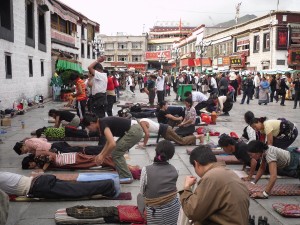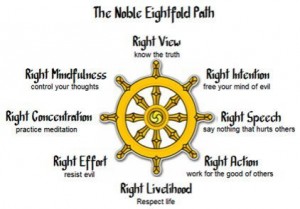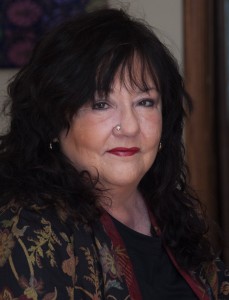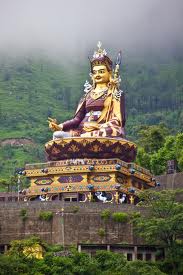The following is an excerpt from a teaching by Jetsunma Ahkon Lhamo called “Art of Dispelling Anger”
We must take ourselves to task more. I don’t want to speak harshly because harshness doesn’t help, but I want to say succinctly and directly, we have to take ourselves to task regarding our faults and our poisons. When I think of the Tibetan culture, that’s a lot easier because there isn’t that attachment to materialism. Even in terms of the roots of the culture itself without religion, they were a nomadic people and they had things, but you couldn’t carry much. You had your yaks and your yurts and that was it.There wasn’t that much variety in food; there wasn’t that much variety in clothing. It’s true that the aristocratic Tibetans used to collect jewelry—some of the strangest looking jewelry. It was intense jewelry, and that was considered a status thing. But for the most part, culturally, a Tibetan Buddhist would not have a hard time understanding that hatred, greed and ignorance and particularly desire, as the Buddha taught, keep us revolving endlessly in samsara. We, unfortunately, are programmed quite differently.
I know in my household and in those of many people that I’ve talked to, there was confusion. My mother was sort of a lox and bagel Jew and my father was a twice a year Catholic; and we were supposed to somehow dance in the middle. So when mama won we were going one way and when daddy won we were going the other way. I think that this happens with a lot of people. They are raised with a lot of confusion around religion. And even when they are taught that faith and religion should be a part of their life, and even when they are given the Western ten commandments, still there is so much confusion because we seem to find ways around that.
Thou shalt not kill. But you can kill bugs, animals and enemies. So who are you not supposed to kill? I will not kill you. That will do it. So there is tremendous confusion around that. How does one venerate these absolute laws that have to do with a moral and ethical human when there is so much confusion around them? I mean, thou shall not kill but go to war. How does that make sense to a child? And so, as we grow up with religion, even though we have been founded in religion, or have some foundation in it, the information that we’re given is very confusing. Thou shalt not commit adultery. Whose family hasn’t had a little bit of that? You know, it’s just crazy.
And so, first of all, we’ve learned to be a little bit hypocritical; but most of all, we’ve learned that these laws don’t really matter, and that’s really sad. So when we become Buddhist, we hear that there is a Vinaya and there are certain things that we must not do. And that if we take a life, we understand that we will be giving our lives someday from having taken a life because karma works like that. Karma is exacting. When the cause arises, the results arise independently and simultaneously. It’s our misjudgment through having the mind of duality that makes it seem like time stretches out. So even though you may not have the result of that bad karma until later on in life or even some future life, definitely we know from studying, at least. And every once in a while we get blessed with a little instant karma, so we have sometimes the opportunity to learn; but still that confusion is rampant, really rampant.
We want to practice Buddhism, so we take the teachings. We get to all the retreats; we see the right teachers; we try to do the practices. Yet we don’t really change ourselves. It is an amazing thing to me that students can be on the path for so long and even try to go to the completion stage practices, the tsa lung and the trekchod and togyal, and go to those levels and practice them with some part of their mind, and yet the rest of them is somehow remaining the same. To me that is probably the worst tragedy on the path. It’s the one that makes me not like to teach, but that’s the battle I fight with myself, you know. I’m just being honest.
Copyright © Jetsunma Ahkon Norbu Lhamo All rights reserved









